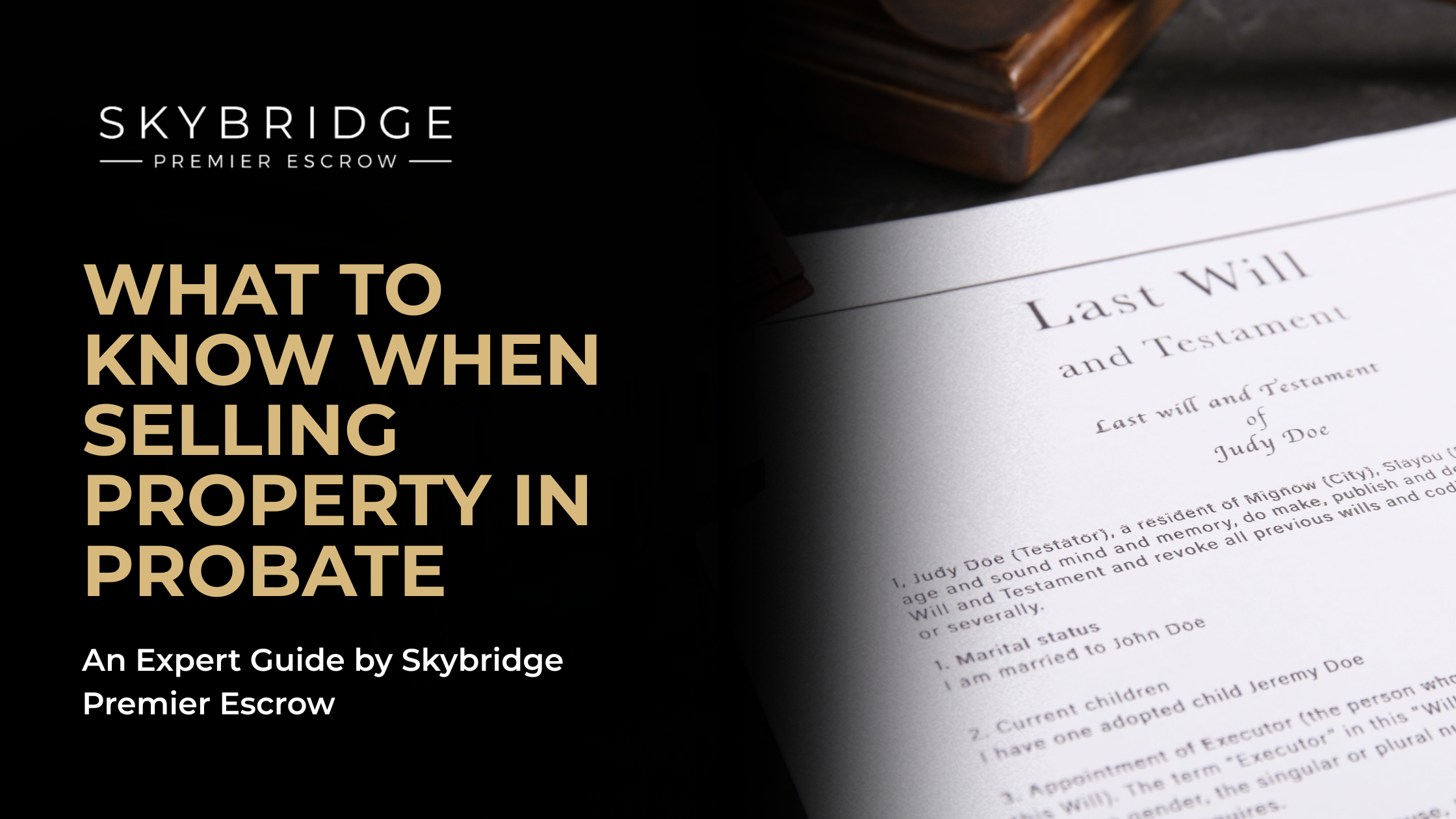
Selling Property in Probate: What to know before Starting the Process
A probate sale is not a standard real estate transaction. It requires court oversight, legal documentation, strict timelines, and an escrow team experienced in probate escrow procedures. Even one missing form, an expired court document, or incorrect title vesting can delay the closing or cause the court to reject the entire file.
Because of this, choosing a licensed, bonded, and experienced escrow partner is essential. A probate real estate transaction differs from a traditional sale and must adhere to state probate code and court requirements with precision.
Skybridge Premier Escrow specializes in selling property in probate, trust, conservatorship, and court-controlled escrows. Our team ensures every file is processed with accuracy, confidentiality, and full legal compliance. We give families, attorneys, and agents confidence that the probate escrow is handled correctly from start to finish.
What is a Probate Sale?
A probate sale occurs when a property owner passes away and the probate property must be transferred under court supervision. If the home was not placed in a living trust, the estate must complete the probate process before escrow can close.
A probate real estate transaction is required when:
- The property title remains under the deceased person’s name
- There is no trust protecting the asset
- Multiple heirs or beneficiaries are involved
- The will requires court processing
- The estate must be liquidated to settle debts or distribute assets
Many buyers searching for probate homes for sale or probate property for sale do not realize the level of legal oversight required. No funds may transfer and escrow cannot close without court authority.
Who has the Legal Authority to Sell a Probate Property?
A probate property cannot be listed, marketed, or opened in escrow unless the seller has formal legal authority.
Roles Legally Allowed to Sell
|
Role |
Description |
|
Executor |
If the deceased left a valid will |
|
Administrator |
If there is no will, also called an intestate case |
Both must receive legal authority before a probate house sale can move forward.
Required Court Documents
|
Document |
Purpose |
|
Letters Testamentary |
Gives authority to the executor named in the will |
|
Letters of Administration |
Gives authority to the court-appointed administrator |
Documents Required to Open Probate Escrow
Most probate escrows require:
- Certified Letters Testamentary or Letters of Administration
- Death certificate
- Court-approved purchase contract or listing agreement
- Copy of the will if applicable
- Court confirmation order if limited authority applies
- Buyer disclosures and agency forms
Missing paperwork is the number one cause of delayed probate escrow closings and one of the most misunderstood parts of what a probate sale is for new buyers and sellers.
Full Authority vs Limited Authority
|
Type |
Description |
|
Full Authority |
No court confirmation required Escrow may proceed normally |
|
Limited Authority |
Court hearing and the overbid process are required |
Authority level determines:
- Whether a hearing is needed
- Whether overbidders may participate
- Whether a judge must issue a sale confirmation
- Whether escrow can close immediately or must wait
A probate-trained escrow officer guides agents, heirs, and attorneys throughout the entire process.
Are Probate Sale Cash Only
This is one of the most common questions buyers ask when looking for probate homes for sale or probate property for sale.
The answer is simple:
No, probate sales are not cash only.
Most probate house sales allow:
- Cash
- Conventional loans
- Private financing
- Hard money loans
The financing simply needs to follow court timelines and meet escrow deadlines. Court dates cannot be moved, so escrow must verify that the lender can perform quickly and without delay.
Why Probate Escrow Requires a Specialized Partner
A probate real estate transaction involves more moving parts than a typical residential sale. Probate escrow requires:
✔ Compliance with state probate code
✔ Secure handling of estate, fiduciary, and court-restricted funds
✔ Exact title vesting per court order
✔ Neutral third-party legal responsibility
✔ Multi-party coordination with attorneys, heirs, agents, and buyers
✔ Document verification before funds are released
✔ Tracking authority and approval from opening to closing
A general escrow processor may not understand:
- Court confirmation procedures
- Overbidding rules
- Required vesting language
- Authority expiration
- Court instructions governing disbursement
This lack of experience can delay a probate sale for weeks or result in rejection from the court.

https://shorturl.fm/S1UbZ
https://shorturl.fm/SVFtR